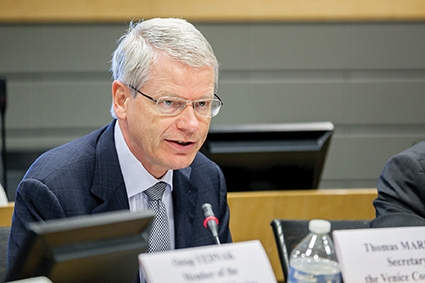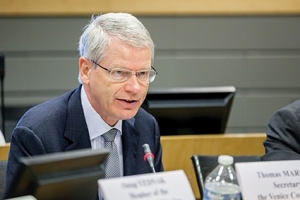Laws, Land & Voting: The Venice Commission’s View
Constitutional amendments, getting them approved, then getting a nod from opposition, then from the Venice Commission (apparently, no nod is necessary from the people), has become a problem of Gordian knot-like proportions for the ruling party, Georgian Dream. The role of the Venice Commission is especially under scrutiny: were they really blackmailed by the government, as the opposition claims? How come their preliminary conclusion was leaked (and who did it?) and what are their views on the much-debated changes that are allegedly curtailing the President’s powers even further? With this and many other questions, GEORGIA TODAY and Panorama TV Show met the Secretary of the Venice Commission, Mr. Thomas Markert, for an exclusive interview.
What were the takeaways from the meeting? Did you reach a compromise, and if so, on what issues?
It is not for the Commission to reach compromise but rather that compromise has to be reached within Georgia. But we did give an opinion on the text which was presented to us and I can say that, overall, our opinion is very favorable; we appreciate the process, we appreciate the good cooperation with the Commission and we think that this revised constitution is a good step towards a more coherent parliamentary system and government in Georgia. So, overall, our assessment is quite positive.
What do you say to claims that the gov’t is putting pressure on the Commission?
It didn’t happen. Our cooperation with all Georgian authorities, with the Speaker, and also with the President, was always correct.
And to the leaking of the Commission’s preliminary opinion paper?
I can’t say as we sent the paper to both parties, to the President- who is not opposition but the Head of State, to the Parliamentary Speaker and to the permanent representation in Strasbourg. We have no idea who is responsible for the leak.
One fear is that the changes might be used by the gov’t to further cement its position and impose its agenda over the opposition
The overall aim to reform is to move Georgia to a fully-fledged coherent parliamentary system. It is normal in a parliamentary system that the president is not elected directly by the people but elected indirectly, because if you elect the president directly it tends to store more powers. I don’t think it’s possible to be a neutral president if elected by the people because they campaign and then have to fulfil their campaign [promises]. The Commission does not say that it is necessary to have an indirect election of the president under the new constitution but we have no objection to this change, although it is important for us that this change is not carried out immediately, next year, but only from 2023. This shows that this systemic change, which is a new structure, is not an act directed against a specific person.
Some say the Prime Minister is getting too much power in his hands. The new amendment says he can change ministers at will and needs no confidence vote from parliament after 5 ministers have been replaced. What’s your take?
For us, it’s important that the rules of no-confidence in the government were amended, making it much easier for parliament to remove the PM and government. This is really a normal check on the powers of the PM in the parliamentary system. So, we have no problems with this approach.
What’s the European know-how on the proportion voting system and distribution of non-allotted mandate?
I don’t think it’s only European know-how because various systems work differently in different countries. In Georgia, we have seen that the mixed system gave overwhelming majority to one party and this is not good. Therefore, we welcome a change to the proportional system. Now these changes are qualified by different mechanisms, the 5% clause, prohibition of blocks and rules on wasted votes. We expressed concern especially with respect to the latter, however, we were informed by the Speaker that the plan is to change this rule and to limit this premium for the majority.
What are the remaining issues that you expect the gov’t to deal with?
There are number of minor issues concerning fundamental rights, different wording, etc. One issue we don’t agree with the majority and maybe opposition is that we would like to see the establishment of a second chamber, a senate, already- no more waiting for the reintegration of Abkhazia and South Ossetia in order to have different counterweight to the power of the government and the majority. And there are some issues concerning judiciary. We were informed that the probationary period for judges will be abolished in a few years. We understand it cannot be done immediately, you have to prepare for it. And the issue of election and appointment of Supreme Court judges.
Two of the amendments are sparking quite a debate– one maintains that the definition of ‘family’ is a union between a man and a woman, and another prohibits the sale of agricultural land to foreign citizens. What’s the Commission’s take on this?
As regards the first change, we’re not necessarily in favor. The current constitution was good enough and is preferable in so far as it leaves room for future development, but we don’t say that this change contradicts European standards. However, we are in the line that this change should not be interpreted as prohibiting the possibility for same-sex registered partnerships. As regards the other issue, it is not so much the concern of the Venice Commission. It is certainly good to have some flexibility in this respect in your future for European integration. So, it would be best not to have a strong constitutional rule on this but rather leave this regulation to organic law.
Vazha Tavberidze












